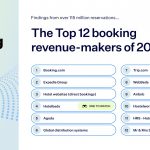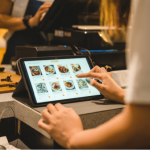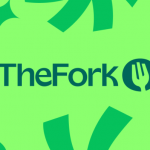In less than 85 days, 2022 will come to a close as we usher in 2023.
NB: This is an article from CartStack
It’s hard to believe the speed at which this year seemed to pass, a stark (but welcomed) contrast to the two years spent in relative stillness due to the pandemic. For most of us, this past year felt like a breath of fresh air – an opportunity for social and economic redemption after one of the most challenging experiences of our time.
Subscribe to our weekly newsletter and stay up to date
For industries like hospitality, 2022 represented a long-awaited period of recovery, a finish line to the pandemic, and a starting line to a new landscape and a new wave of travelers eager to make up for lost time.
Of course, there have been many bumps in the road, and as we collectively shake off the fear and uncertainty of the pandemic, hoteliers must do their due diligence in getting familiar with the hospitality landscape which emerged after the dust settled. As the saying goes, “you can’t manage what you can’t measure,” and we can’t expect to adapt to (and better yet, capitalize) on the newly evolved preferences and trends set to shape our industry if we don’t first identify what those are. With 2023 clear on the horizon, it’s time to look at the booking trends and statistics which have dominated 2022, so we can leverage that information as we look ahead.
1. Optimize All Booking Channels
Hotels and travel companies are expected to provide a seamless, user-friendly experience across all digital mediums; however, desktop remains the preferred booking channel. Adobe research has found that about 52% of travelers used a mobile device to find information about hotels, restaurants, tours, and activities in their chosen destination, but only 21% book on a mobile device. Current statistics also indicate that over 90% of travelers will do their research online, and most people who do their online travel research will do it on the desktop site, as only 23% of leisure travelers believe they can get the same hotel or flight deal on mobile, compared to desktop.
There is a caveat, however. Recent research has shown that mobile is often the preferred channel for last-minute bookings. Findings from Revenue Hub indicate that by the summer of 2020, mobile bookings increased to over 24%, almost one-quarter of all hotel bookings. In 2020, on average, mobile bookings represented over 27% of total bookings for hotels studied and remained above 40% in 2021. Not only that, but 66% of millennials reportedly now book their trips using a smartphone. With this in mind, hotel brands must optimize all digital booking mediums to ensure the experience offered to prospective guests is consistent, streamlined, and enticing.
2. The Experience Economy is Alive and Well
Research indicates that 78% of millennials would rather spend their money on experiences than on things. Moreover, 77% of millennials say some of their best memories were made at events, and 79% who say that going to live events together helps them feel closer to the friends and family they attend with. This should come as no surprise, especially in the wake of the pandemic, as in-person events and experiences became the commodity many of us missed the most.
To this effect, recent Tripadvisor research revealed that more than a third of travelers across the U.S., U.K, Australia, Japan, and Singapore say traveling to a destination they have not previously visited is more critical now than before. Travelers also said the top three most important factors in future plans were to have new experiences, learn about history and culture and “get immersive” by seeing new places. Tripadvisor also found that the average spend per trip for 2022 is likely to exceed that of 2019.
Not only that, but the travel sector recovered over 50% of its gross revenue by the end of 2021 when compared to the pre-coronavirus numbers. This recovery is projected to reach 85% by the end of 2022, and the online travel industry is projected to grow at a compound annual growth rate (CAGR) of 10.58% between 2021 and 2027 — when it’s expected to hit $1463.98 billion (GBTA).
This is, of course, music to hoteliers’ ears, as it indicates that travelers are ready and willing to book travel experiences in the near future. The appetite for travel is back – it’s simply up to hotel brands to set the table.
3. A Picture is Still Worth a Thousand Words
When we consider the factors that differentiate one hotel’s listing from the next, one element that clearly reigns supreme: is high-quality photography. Hotels that have a significant number of high-quality photos on their websites see a 15% increase in conversion rates. Furthermore, TripAdvisor shared that the number of photos a hotel has on its TripAdvisor profile has the most impact; properties with at least one photo see a 138% increase in engagement and are 225% more likely to receive a booking inquiry, and those with over 100 photos see a 151% increase in engagement and are 283% more likely to receive a booking inquiry. Research has also revealed that three of the most impactful deal breakers for most travelers are bland and unappealing hotel rooms, non-aesthetic food photos, and boring content presentation.
Although the importance of imagery (and other visual elements) is well understood within our industry, many hotels still do not offer prospective travelers enough high-quality photos throughout the booking experience. Now, more than ever before, hotels should look to immerse prospective guests in the experience their property has to offer at every touch-point of their booking journey – from the booking channel to email marketing and beyond.
4. Direct Bookings Are on the Rise
Hotels and Online Travel Agencies have found themselves in a long-fought war for traveler preference over the years. In the past, the booking simplicity and promotions offered by OTA platforms often cost hotels direct bookings, which can be costly due to OTA commission costs. Fortunately, the pandemic might have (finally) reversed that trend in the favor of hotels. Recent data indicates that travelers became frustrated with OTAs at the pandemic’s beginning when trip cancellations became inevitable and consumers began seeking refunds. Due to poor communication and delays in issuing refunds, many travelers have seemingly lost trust in booking with OTAs.
To this effect, in a survey conducted by GlobalData last June, 39% of consumers said they would typically book direct, compared to 17% who would opt for OTAs and comparators. Moreover, according to Skift, 56% of independent hotel bookings came from direct channels in 2020, up from 39% a year earlier, reflecting a 17% increase.
5. Travelers Are Planning Ahead
Good news, hoteliers. Perhaps in a quest to satiate their renewed appetite for travel, many travelers are now booking their trips further out. A report by Expedia revealed that Q2 of 2022 saw a larger growth in short- to mid-term planning, with the 0- to 90-day search window increasing more than 5% quarter-over-quarter, and the 61- to 90-day window rising 15%. Travelers are also now demonstrating a preference for longer stays rather than weekend getaways. A GlobalData survey reveals that 44% of users prefer leisure trips of at least seven nights, while 26% prefer more than ten nights. Airbnb’s Q3 2021 earnings also reiterated this sentiment, with trips lasting 28 days or longer accounting for 20% of nights booked that quarter, up from 14% a year prior.
This may, in part, be influenced by the post-pandemic growth of the remote workforce, as millions of workers now find themselves working from home permanently or adopting a hybrid work model. With more professional flexibility, individuals and families likely feel more confident booking their trips further out, as they may now have the ability to effectively “work from anywhere.” You know what that means, hoteliers… longer booking windows, more opportunity to convert leads!
6. It’s Time to Get Personal
There is simply no denying it – personalization sells, and it also empowers hotels to establish more meaningful relationships with travelers. Today, consumers expect personalization from brands across all industries, but travelers, in particular, favor hospitality brands that leverage guest data to curate personalized and relevant messaging and offers. In fact, 90% of all travelers expect a personalized experience when they book a hotel.
This is especially important as hotels look to optimize their booking channel and increase conversion rates, which have historically been very low. On average, hotels’ online conversion rate is an abysmal 2.2%, which can be drastically improved through personalization and dedicated booking recovery solutions. With the right technology in place, hotels can seamlessly recover lost bookings by maximizing email engagement with – you guessed it – super-personalized content and offers. A booking recovery solution (like RezRecover) also intelligently displays conditional offers and other content based on abandoned booking dates and other visitor data.
In 2023 and beyond, personalization will be a key tool in attracting new and returning guests who are looking for a hyper-personalized and memorable travel experience. Fortunately, collecting guest data, building guest profiles, and showing guests that you’re paying attention at every stage of their journey has never been easier – as long as you implement the right technology.
Read more articles from CartStack
The post Online Booking Trends and Stats Every Hotelier Should Know appeared first on Revenue Hub.
































